
When Cyberpunk 2077 launched in December 2020, I so desperately wanted to love it. I was enamored with its intricate open-world design, which featured an impressive level of verticality, but it was hard to ever get fully immersed due to its slew of launch problems. Pair that with a lore-heavy story that was filled with cyber-talk and I often found myself feeling lost in Night City — and not in the good way I want from an open-world game.
With its upcoming expansion, Phantom Liberty, CD Projekt Red has a second chance to pull me back in. With a much more stable base game, I’ve been hopeful that the developer could deliver a story that’s a little easier to grasp onto this time. And based on an hour-long hands-on I had with the game around Summer Game Fest, it certainly seems like I’ll get what I want.
Cyberpunk 2077: Phantom Liberty builds on everything I found promising about the base game, but seems to do away with a lot of its pain points. It all makes for what’s shaping up to be a sleeker expansion with narrative heft that’s not as bogged down with dense technobabble. Instead, it’s a good old-fashioned spy thriller that presents tough questions about when to trust authority.
Lords of Dogtown
My demo begins very early in the DLC as I walk through a bazaar within the expansion’s new area, Dogtown. Before I’m able to get out to the open world, I walk through a more linear opening that gives me a sense of how different the slum is from the neon-lit Night City. I find myself crawling through a more industrial area that almost feels like a jungle gym. It’s some of the strongest level design I’ve seen in Cyberpunk to date, sending me through an intricate maze of cranes and urban decay.
There’s a specific narrative reason for that world design. The team explains that Dogtown is a bit of a “ghetto” that’s detached from Night City, both physically and legally. It’s a shady area run by an ex-military tyrant who rose to power making under-the-table deals. Not only that but it was abandoned mid-development, which explains all the crumbling structures and machinery left hanging around. It’s a great, gritty change of scenery packed with little bits of environmental storytelling, like dense graffiti.

It’s not easy to get into either, as Night City citizens need a special reason to be there, otherwise, it’s off-limits to them. And as luck would have it, V does have that reason as they’re roped into a political thriller that involves working with NUSA to protect the president. After an exciting, cinematic opening that reacquainted me with gunplay that feels tighter than the last time I played, I find myself at the center of a full-blown spy story where I’m forced to work with the very authority I’ve always fought against.
I get a very impactful choice early on that speaks to that tension. After briefing me on my mission, the president asks if I want to take an oath to become a proper NUSA agent, just to make my mission more official. After giving some serious thought to whether or not it’s worth trusting a distrustful government, I choose to turn it down, prompting some heart-to-hearts about rebellion with Johnny Silverhand. The story beat is much easier to grasp than a lot of what I experienced in the base game. It feels like there’s a lot less lore dumping this time around. Instead, I’m more focused on V’s relationship to authority, with various characters acting like angels and devils on their shoulders.
Speaking of characters, my session ends with the introduction of Reed, a NUSA sleeper agent played by Idris Elba. It comes as no surprise that Elba exudes charisma even in digital form, portraying a more down-to-earth agent who seems to be making his own deal with NUSA work out. He’s a great foil for the loudmouthed sardonic nature of Keanu Reeves’ Silverhand, and I’m hoping we get to see the two interact properly in the full expansion.

Phantom Liberty doesn’t solve every problem I have with Cyberpunk 2077. The missions I played were still filled with long NPC conversations where I’m just left standing around through dialogue dumps. But since there’s more thematic depth this time, I found it much easier to sit through those chats without tuning out. I’m also intrigued by some of the new world activities teased in my demo. At one point, a crate full of loot randomly dropped into the world. I had the choice to chase after it, fighting off the scavengers trying to grab it to gain special loot. It’s something out of Apex Legends, an activity that feels particularly well-suited for the lawless nature of Dogtown.
There’s a good chance that Phantom Liberty might be what draws me back to Cyberpunk 2077. I want to learn more about Dogtown and I’m certainly already interested in the spy thriller story based on a strong introduction. So long as the game can keep that momentum up — and as bug-free as what I experienced in my controlled demo — Phantom Liberty could be the second chance Cyberpunk 2077 needs.
Cyberpunk 2077: Phantom Liberty launches on September 25.



